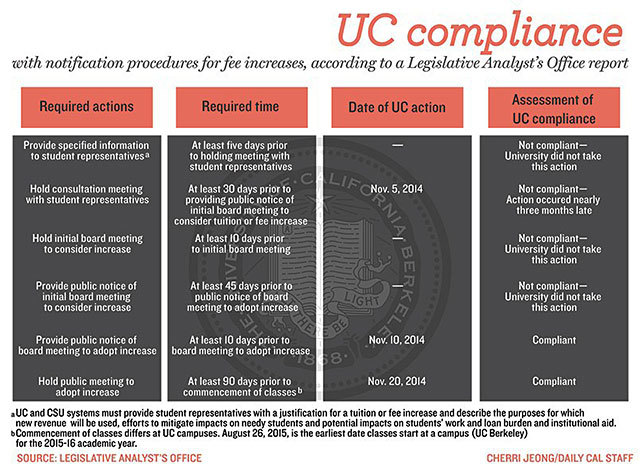Report finds UC not in compliance with tuition-increase notification procedures

By Sahil Chinoy
A report released last week by the Legislative Analyst’s Office, or LAO, found that the university did not comply with certain provisions of state law related to the consultation of students before implementing a recent fee increase.
The report examines specifically the university’s compliance with the 2012 Working Families Student Fee Transparency and Accountability Act, which details notification and consultation procedures, required considerations for fee increases and reporting provisions. According to the report, the university did not comply with provisions in the former two categories in relation to a tuition increase passed at the November meeting of the UC Board of Regents.
The university, however, contests the LAO’s findings, claiming the university was in compliance with the “substantive requirements” of the bill, said UC spokesperson Shelly Meron in an email.
The LAO found the university did not contact and hold a consultation meeting with student representatives prior the fee increase in a timely manner. The report notes that the meeting occurred Nov. 5 — nearly three months later than the deadline required by the law.
The minimum interval between first contacting student associations then implementing an increase is more than six months, according to the report.
The tuition increase, 5 percent each year for the next five years, was passed Nov. 20. The increase could be mitigated or eliminated pending negotiations with the governor and the state Legislature.
In addition, the report found that the university did not hold an initial board meeting to consider the fee increase prior to the meeting at which the increase was passed.
“President Napolitano has personally consulted with students many times — more so than her predecessors — and the tuition issue was discussed during each of those conversations,” Meron said. “The November contingency vote on tuition came after ample notice to students about the possible increase — a key concept behind the legislation.”
To UC Student Association board chair Kevin Sabo, however, “it’s pretty insulting to say the UC is claiming it’s talked to students.” He said the university has conversations with select students or groups instead of negotiating in good faith with the UCSA, an organization with elected representatives from every UC campus.
The report further claims the university “believes it is not legally obligated to comply because of its constitutional autonomy.” In many cases, state legislation affecting the university applies to the university only to the extent that the UC Board of Regents acts by resolution to approve it, and the Legislature has limited enforcement power.
In February, state legislators introduced a bill that would strip the university of its autonomy in some areas.
Sabo said the university’s “wishy-washy” position on whether it’s subject to the provisions is another source of frustration.
“The UC is trying to both say it’s complying with (the bill), even though it doesn’t have to, and saying it doesn’t have to comply with (the bill) when it’s not,” he said.
According to John Aubrey Douglass, a senior research fellow at UC Berkeley’s Center for Studies in Higher Education, while the university is affected by a “truly amazing” number of bills and policies, it usually tries to “follow legislation relevant to public institutions or to the higher education system.”
The university also did not comply with a provision mandating that the university’s tuition-increase policies incorporate “the impact of an increase on various categories of students (including historically underrepresented students and low-income students),” according to the report.
The university contests these findings, too, claiming the university’s policies do take this factor into consideration, according to Meron.
The report also determined that the California State University was in compliance with all provisions of the legislation, but because the CSU system has not recently increased its fees, it was not required to follow any consultation or notification procedures.
[Source]: Daily Californian


